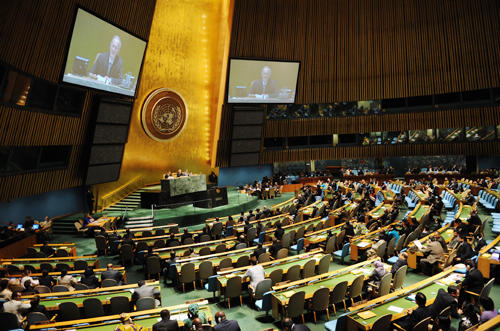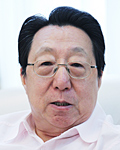|
 |
|
ANNUAL MEETING: The 65th Session of the UN General Assembly opens at the UN headquarters in New York on September 14, 2010 (SHEN HONG) |
On October 24, the UN will celebrate its 65th birthday. Since it reclaimed its lawful seat in the world body in 1971, China has been increasingly involved in UN affairs. And it will make even greater contributions to the UN in terms of financial support, development aid and peacekeeping, said Chen Jian, President of the United Nations Association of China.
In a recent interview with Beijing Review reporter Yu Yan, Chen talked about China's participation in UN affairs and possible future contributions. Excerpts follow:
Beijing Review: Has China fully participated in the major work of the UN?

Chen Jian: China's participation in UN affairs can be divided into three periods. After reclaiming its lawful seat in 1971, China regarded the UN as a forum. At each session of the UN General Assembly, the head of the Chinese delegation would give a speech, elaborating China's diplomatic concepts, diplomatic policies and opinions on major international issues.
A prominent example was on April 6, 1974, when Chinese leader Deng Xiaoping delivered a speech at the Sixth Special Session of the UN General Assembly on behalf of the Chinese Government. In the speech, he publicly set forth Chairman Mao Zedong's theory of the "three worlds." He emphasized China belongs to the Third World and will always stand by other Third World countries. It will never seek to be a superpower. This speech received positive responses in the UN. But generally speaking, in that period, China adopted a detached attitude, giving up its vote on many issues.
The second period started in the 1980s. During this period, Deng carried out two reforms. First, China started to accept the aid of the UN and its agencies. China also started to participate in UN peacekeeping activities.
Before that, due to the Korean War, China had regarded peacekeeping as a tool major powers used to intervene in the affairs of small nations. After returning to the UN, and after years of observation, it realized the positive role of peacekeeping operations. In the meantime, as a permanent member of the UN Security Council, China can have a say in these operations. In the late 1980s, it eventually changed its attitude on peacekeeping. Currently, the number of Chinese peacekeepers ranks 13th in the world, and first among the five permanent members.
 |
|
ENDING HUNGER: Li Ning, World Food Program Ambassador Against Hunger and former Chinese gymnast, distributes China's food aid in Sirajganj District in north Bangladesh on December 6, 2009 (NIAN YIFENG) |
The third period started with the beginning of the 21st century. Since then, both the UN and China have undergone significant changes. China's interests are no longer solely domestic, and its influence is expanding beyond the region. Many global issues now concern China's vital interests. This requires the country to participate in UN affairs in a more active manner to safeguard its own interests.
|
